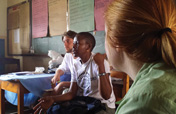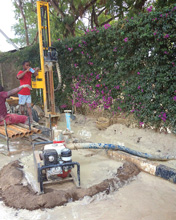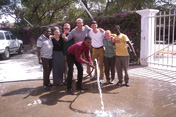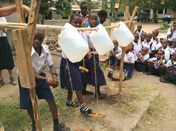Bringing Clean Water to the Mabibo-Makuburi Community in Tanzania
- Tula Ngasala
- Doctoral Student, Civil Engineering
- College of Engineering

MSU-SWB members Justin Rowe, Tula Ngasala, and Lisa Warner discuss education program on sanitary practices at a primary school office in Mabibo, Dar es Salaam.
Water is everything. Just ask Tula Ngasala, who comes to MSU from Dar es Salaam, Tanzania, where water is always in short supply—especially if you happen to be poor.
"There's not enough for household use, let alone gardening," said Ms. Ngasala. "We had a water supply system through the government 60 years ago, but it's old and the population has been increasing. Production capacity is not enough. In addition to scarcity of water, our wastewater disposal system is very poor.
Most people have pit latrines or septic tanks that are poorly designed. When full they get dumped into water bodies untreated. Even if someone has a pumping well, it's likely to be contaminated. Residences are too close."
Looking for water as well as paying for it takes up a lot of time and resources. Ngasala remembers that as a child it was her job to do the looking, along with the rest of her household chores and school requirements. Later, when she enrolled at the University of Dar es Salaam (UDSM) already knowing that she wanted to major in water resources and be a civil engineer, it seemed like a natural outgrowth of those childhood experiences.

Well drilling in progress.
She arrived at MSU about six years ago with a freshly minted master's degree from UDSM, determined to help her home community solve its water and sanitation issues.
Her church in East Lansing, University Lutheran, was ready to help. The church has a small endowment fund that was accepting applications. They worked with Mabibo-External Lutheran Church in Dar Es Salaam to put together the application, and were awarded $4,000. David Wiggert, a retired MSU engineering professor who is also a member of the church, helped connect her with Engineers Without Borders (EWB) and Susan Masten, professor of civil and environmental engineering and the MSU EWB chapter's faculty advisor. Ngasala also credits Vicki Anderson, another member of the East Lansing church and a good friend, as having "great ideas on how to get help. She was my main advisor." Anderson is a consultant at MSU's Institute of Water Research.
"University Lutheran Church established a service theme of 'Clean Water' for 2013-2014. We did local service projects related to clean water and we also wanted to make an impact internationally. The well project in Tanzania provided that opportunity. I was an adviser to the students on the education aspect of the project. I attended MSU (B.S. Crop & Soil Science '78, M.S. Resource Development '92) and was very impressed with my fellow Spartans who worked on this project. The students put in a lot of personal time and their openness to input and suggestions was wonderful. They were eager to explore different approaches. I think the project's success was due in no small part to the project management abilities of the student leaders."
Vicki Anderson
Consultant
MSU Institute of Water Research
The MSU-based organization Spartans Without Borders (SWB) has a mission that is similar to (though broader than) that of EWB. Dr. Masten urged Ngasala to apply for funding from SWB rather than EWB. "If we had applied through EWB, we might not have gotten the contract," said Masten. "They would have put it out for open bid. We wanted to make sure that we would be doing this project ourselves."
Along with engineer Malumbo Mhamilawa, Ngasala is cofounder of the nonprofit organization Water, Environment, Energy, and Sanitation (WEES). WEES was the on-site nonprofit consulting firm (NGO partner) and main contact between the community in Dar es Salaam and Spartans Without Borders. WEES also provided site supervision and technical support throughout the project.
The SWB project team has now dug a well and built a distribution system on the grounds of the partnering church in Dar es Salaam, with whom they have signed a memorandum of understanding, with the church acting as representative for the community.
Although a previous hydrogeological survey had predicted that the well would have a high salt concentration, surprisingly it did not. "They've tested the water coming through it and it's OK—slightly saline, but OK. Even if saline water isn't good for drinking, it's OK for household use if it's clean. But this is OK for drinking," said Ngasala, who attributes the success of the project to two factors. First, a hydrogeologist was hired to find a good aquifer. Second, they dug a very deep well to ensure that the water supply would be reliable.
Teaching Sanitary Practices

MSU-SWB team spouts off in Mabibo, Dar es Salaam.
Along with drilling a well this past summer, the team also introduced a health education program about clean water. "We talked to adults, both men and women, and to pre-school as well as primary school children in two sessions—younger (age 7-10) and older (age 11-14)—at each school. We covered hand-washing and sneezing. We did skits to make it easier for the kids to understand. We installed a hand-washing Tippy Tap, a hands-free device where you use a foot pedal to tip out the water supply from a big jug. You can put it anywhere, outside or in. We built one in each school and in the church." They also talked to adults about how to make a Tippy Tap and how to avoid getting malaria (a primary community concern) by keeping everything clean and following proper water treatment procedures like boiling and filtering. They also talked to women-only groups, a new idea in this community. For the women it was less of a presentation and more of a conversation about what they need, said Ngasala. It was also about challenging assumptions: "They had been using sanitary pads made of cloth, assuming that was less expensive than disposables. But cleaning the cloth pads requires a lot of water. They did a cost analysis and it turned out that because of the water shortage, using the disposables was way cheaper."

Children practice the tippy tap process.
Plans for the future include a rainwater collection system using the church roof to harvest fresh rainwater, which will augment the water supply from the new well. Long-term hopes include a wider distribution system, as many of the widows in the women-only meetings said they wished the water could be distributed further out.
Ngasala believes the work is sustainable over the long range because "the church will take care of its own." She plans to do her dissertation research on sanitation and wastewater treatment, and it will include this project. "We will follow up with the well project for the next five years," she said. And after that? "After I get my Ph.D., I will work as a professional and help other communities who are facing similar challenges," she said.
- Written by Linda Chapel Jackson, University Outreach and Engagement